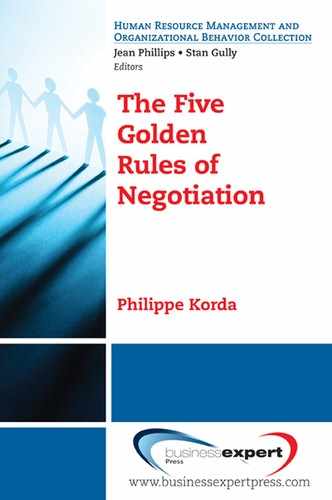Margaret Peake’s Office, 2 Years Earlier
In Carl Ritchie’s line of work, November is the month when price increases are negotiated. Each year, at this time, the company sends its customers a letter announcing a price increase from January 1. Carl Ritchie’s role is then to go and see his customers and negotiate the price increase. This is because, without fail, buyers reject the increase announced in the letter, which they deem excessive, “ridiculous,” or even “outrageous.”
That year, Carl is just getting to know Margaret Peake. He is only too well aware that she has a thorough knowledge of the market and of trends in her suppliers’ production costs. Furthermore, the previous year the negotiations over the price increase had been long and difficult. In his letter, Carl’s sales director announced a 4% price increase. Margaret Peake had reacted very badly and had summoned Carl immediately. She had opposed any increase of more than 1%. It had then required many hours of negotiation and two visits in order to ultimately agree on a compromise of 2.5%, which was the exact figure that Carl had predicted to his company’s management.
This year, Carl decided to change his negotiating methods: It was pointless, he thought, to spend hours “haggling” in a confrontational environment, only to ultimately “split the difference.” So, despite a somewhat chilly reception, when Carl entered Margaret Peake’s office, he was feeling confident.
Margaret PEAKE: I have the distinct impression that your sales director is living in cloud cuckoo land! Every year he tries to impose a 4% increase on me, even though he is facing ever more competition! Does he not realize this, or does he just have a weird sense of humor?
Carl RITCHIE: He is only too aware of the state of the market, and as you know, those are “standard letters” to some extent and do not take account of our day-to-day relationships with each individual customer.
Margaret PEAKE (visibly relieved): Oh!
Carl RITCHIE: Furthermore, as for next year, I have a proposal to put to you: Let’s not waste our time in pointless haggling. I’m going to offer you a realistic price adjustment, one that takes into account your purchasing potential and our ongoing relationship, and I propose that we seal the deal at that price.
Margaret PEAKE: Why not?
Carl RITCHIE: I believe that a 2.5% increase is the minimum that we can realistically envisage. I’ve taken the initiative to make you that offer from the outset and, as you may have gathered, it is my best offer.
Margaret PEAKE (frostily): That is unacceptable.
Carl RITCHIE (disconcerted): But…
Margaret PEAKE: Let’s talk seriously, shall we, Mr. Ritchie? Every week I receive offers from your competitors all around the world—from India, Russia, China—for much better terms than you offer me, even before any price increase!
Carl Ritchie tries to fight back: The Indians still have very little experience in this market, their Russian competitor currently has a reputation for being rather unreliable, the Chinese cannot offer the best customer service guarantees. But Margaret Peake shakes her head in disagreement.
Margaret PEAKE: That is becoming less and less true, Mr. Ritchie. You need to adapt to the market.
Carl RITCHIE: That is what we are doing, day in and day out!
Margaret PEAKE: You see, ultimately, I want to continue to work with you—but not on any old terms. In order to help you, I’m prepared to accept an increase of 0.5% from January 1 and potentially, depending on the economic climate, another 0.5% increase in July, but I don’t want to commit myself to that.
Carl Ritchie turned pale. It required three visits and four hours of negotiation in order for him to achieve a 1% increase from January 1 and 0.5% from July 1.
